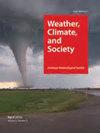Societal attention to heat waves can indicate public health impacts
IF 1.9
4区 地球科学
Q3 ENVIRONMENTAL STUDIES
引用次数: 1
Abstract
Both the frequency and intensity of hot temperature extremes are expected to increase in the coming decades, challenging various socio-economic sectors including public health. Thereby, societal attention data available in real time, such as Google search attention, could help monitor heat wave impacts in domains with lagged data availability. Here, we jointly analyze societal attention and health impacts of heat waves in Germany at weekly time scales. We find that Google search attention responds similar to hot temperatures as indicators of public health impacts; represented by excess mortality and hospitalizations. This emerges from piecewise linear relationships of Google search attention and health impacts to temperature. We can then determine temperature thresholds above which both attention and public health are affected by heat. More generally, given the clear and similar response of societal indicators to heat, we conclude that heat waves can and should be defined from a joint societal and meteorological perspective, whereby temperatures are compared with thresholds established using societal data. A better joint understanding of societal attention and health impacts offers the potential to better manage future heat waves.社会对热浪的关注可以表明对公共健康的影响
预计未来几十年极端高温的频率和强度都将增加,对包括公共卫生在内的各个社会经济部门构成挑战。因此,实时可用的社会关注数据,如谷歌搜索关注,可以帮助监测数据可用性滞后的领域的热浪影响。在这里,我们以每周的时间尺度共同分析了德国热浪的社会关注和健康影响。我们发现谷歌搜索注意力的响应与高温相似,是公共卫生影响的指标;以过高的死亡率和住院率为代表。这是从谷歌搜索注意力和健康影响对温度的分段线性关系中得出的。然后,我们可以确定温度阈值,超过这个阈值,注意力和公众健康都会受到高温的影响。更一般地说,鉴于社会指标对热量的明确和相似的响应,我们得出结论,热浪可以而且应该从社会和气象的联合角度来定义,从而将温度与使用社会数据建立的阈值进行比较。更好地共同了解社会关注和健康影响,为更好地管理未来的热浪提供了可能。
本文章由计算机程序翻译,如有差异,请以英文原文为准。
求助全文
约1分钟内获得全文
求助全文
来源期刊

Weather Climate and Society
METEOROLOGY & ATMOSPHERIC SCIENCES-
CiteScore
3.40
自引率
13.60%
发文量
95
审稿时长
>12 weeks
期刊介绍:
Weather, Climate, and Society (WCAS) publishes research that encompasses economics, policy analysis, political science, history, and institutional, social, and behavioral scholarship relating to weather and climate, including climate change. Contributions must include original social science research, evidence-based analysis, and relevance to the interactions of weather and climate with society.
 求助内容:
求助内容: 应助结果提醒方式:
应助结果提醒方式:


